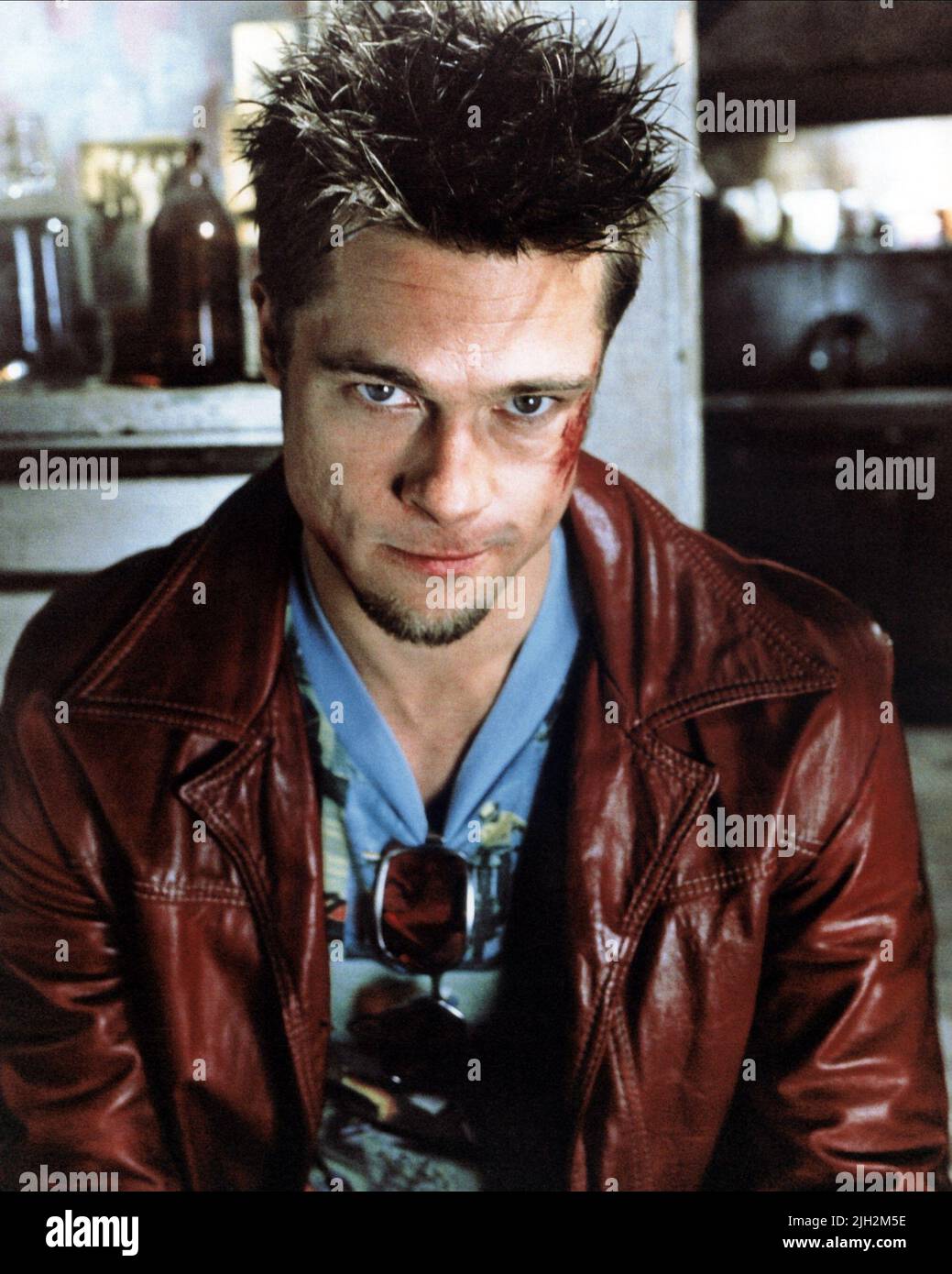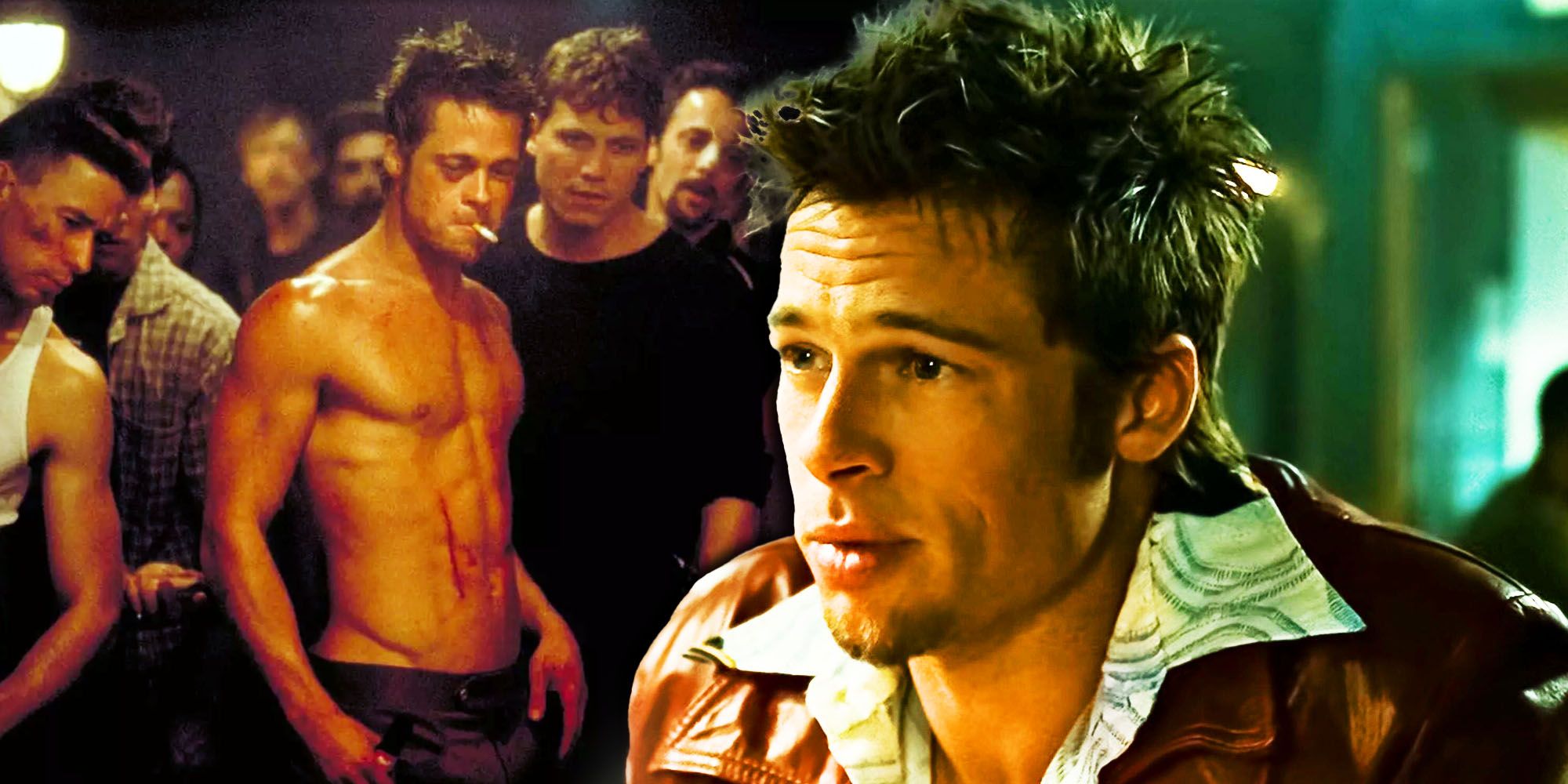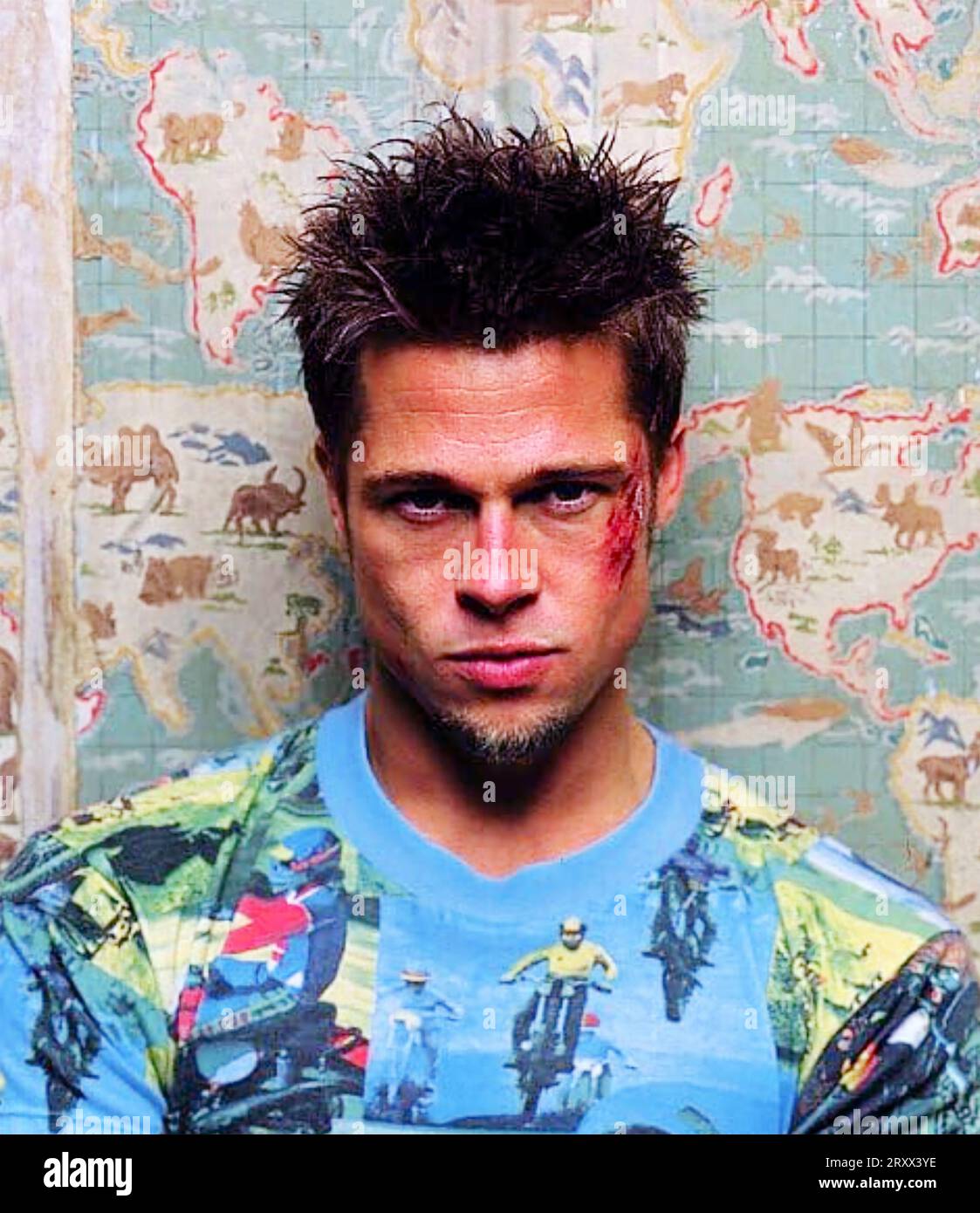Brad Pitt's Iconic Turn: Unpacking The Enduring Impact Of Fight Club
Have you ever felt like life was just... going through the motions? That there had to be something more, something raw and real beyond the everyday? Many people feel that way, and a film that really speaks to that feeling, perhaps more than any other, is *Fight Club*. It's a movie that, quite frankly, gets people talking, making them question everything they thought they knew about identity and modern living.
This film, released in 1999, remains a powerful cultural touchstone, largely thanks to its bold story and, very much, the unforgettable performance by Brad Pitt. His portrayal of Tyler Durden isn't just a character; it's a force of nature, a symbol of rebellion against consumerism and societal norms. Pitt, you see, really brought something special to the screen in this role, capturing the attention of audiences and critics alike, which is pretty amazing when you think about it.
So, what makes *Brad Pitt Fight Club* so special, even after all these years? We'll explore the character of Tyler Durden, the movie's deeper messages, and why it continues to captivate viewers today. It's a story that, you know, just sticks with you, long after the credits roll, prompting plenty of thought and discussion.
- Steve Buscemi Airheads
- Clint Eastwood El Camino
- Rapper Timbaland Net Worth
- Steve Buscemi Good Buddy
- Mark Henry Wrestler Net Worth
Table of Contents
- Brad Pitt: A Look at the Actor Behind Tyler Durden
- The Genesis of Fight Club
- Tyler Durden: The Unforgettable Character
- The Film's Lasting Messages
- Fight Club and Its Critical Reception
- The Enduring Legacy
- Frequently Asked Questions About Fight Club
- A Final Thought
Brad Pitt: A Look at the Actor Behind Tyler Durden
Before diving too deep into his amazing role in *Fight Club*, it helps to get a little sense of Brad Pitt himself. He's an actor who, quite honestly, has had a fascinating path in Hollywood. His early career saw him taking on smaller parts, learning the ropes, and getting ready for bigger things. For instance, he started as a temporary actor in movies like *No Man's Land* back in 1987, which was, you know, a pretty humble start for someone who would become such a big star.
After finishing acting school in 1983, he spent time doing temporary acting jobs, even appearing as a somewhat disliked rock musician in the TV show *Growing Pains*. That's actually how many actors begin, getting their feet wet in various projects. His dedication, you can see, eventually paid off big time, leading him to some of the most memorable roles in modern cinema, with *Fight Club* being a standout, of course.
It's interesting to note that around the time *Fight Club* came out, Pitt also met Jennifer Aniston. His personal life, in a way, was just as much in the public eye as his professional one. But it's his work on screen that really cemented his place as a leading man, a performer capable of playing deeply complex figures, which is a rare gift for an actor, really.
- Tom Hanks Greek Orthodox
- Tom Hanks Education
- Joaquin Phoenix Quotes
- Matthew Mcconaughey Egg Salad
- Wanya Morris Net Worth
Personal Details and Bio Data
| Detail | Information |
|---|---|
| Full Name | William Bradley Pitt |
| Date of Birth | December 18, 1963 |
| Place of Birth | Shawnee, Oklahoma, U.S. |
| Occupation | Actor, Producer |
| Notable Roles | Tyler Durden (*Fight Club*), Billy Beane (*Moneyball*), Cliff Booth (*Once Upon a Time in Hollywood*) |
| Key Collaborations | David Fincher (*Fight Club*, *Se7en*, *The Curious Case of Benjamin Button*) |
| Awards | Academy Awards, Golden Globe Awards, BAFTA Awards (among others) |
The Genesis of Fight Club
*Fight Club* didn't just appear out of nowhere; it came from a novel by Chuck Palahniuk, which, you know, had quite a following already. David Fincher, a director known for his distinct visual style and often dark themes, was the one who brought this story to the big screen. His previous work, including films like *Se7en*, showed he had a knack for creating intense, thought-provoking cinema, so he was a good fit, really.
The story centers on an unnamed man, played by Edward Norton, who suffers from a pretty bad case of insomnia and feels disconnected from his mundane life. He's trapped, you could say, in a world of endless consumer goods and a job that leaves him feeling empty. Then, he meets this rather strange soap salesman, Tyler Durden, played by Brad Pitt. This meeting, you might say, changes everything for him, leading him down a very unexpected path.
Soon after meeting Tyler, the narrator finds himself living in Tyler's somewhat squalid house, and their unusual friendship begins to take shape. This setup, you see, lays the groundwork for all the chaos and self-discovery that follows. The film, in a way, just pulls you into its unique world right from the start, making you wonder what will happen next.
Tyler Durden: The Unforgettable Character
Brad Pitt's portrayal of Tyler Durden is, arguably, one of the most memorable characters in film history. He's charismatic, dangerous, and utterly captivating, which is a pretty powerful combination. Durden is the kind of figure who challenges everything, pushing the boundaries of what's acceptable, and Pitt really brought that wild energy to life on screen.
The character of Tyler Durden represents a kind of primal rebellion against the suffocating nature of modern society. He's anti-consumerist, anti-establishment, and he offers a raw, unfiltered alternative to the narrator's dull existence. Pitt's physical transformation for the role was also quite something; he appeared lean, chiseled, and very much ready for a fight, which added to the character's appeal, you could say.
As one person put it, "Eighteen years later, the only man who makes me want to go crazy in bed is Brad Pitt. Only he can arouse my sexual desire, I'm crazy, I'm obsessed with him. I'm obsessed with him." This sentiment, you know, speaks to the raw, almost magnetic appeal Pitt had, especially in roles like Tyler Durden. He just had this incredible presence that drew people in, making Tyler feel incredibly real and, at the same time, somewhat mythical.
His performance, alongside Edward Norton's, created a dynamic that truly made the film work. The chemistry between the two actors was, quite frankly, electric, making their complex relationship feel believable and intense. You could really feel the tension and the strange bond between them, which, honestly, makes the film so compelling to watch.
The Film's Lasting Messages
*Fight Club* is so much more than just a story about underground brawling; it's a deep dive into themes that are, perhaps, even more relevant today than they were in 1999. The film really takes a hard look at consumerism, showing how people often define themselves by the things they own, rather than who they are inside. It suggests that this pursuit of material possessions can leave people feeling empty and lost, which is a powerful message, you know.
Another major theme is masculinity and identity in a modern world. The characters, especially the narrator, seem to be searching for something authentic, something that feels real and challenging, outside of the typical societal expectations. The "fight club" itself becomes a way for these men to feel alive, to experience something primal and genuine, even if it's through pain, which is a bit unsettling, really.
The film also explores mental health, though perhaps not in the most straightforward way. The narrator's insomnia and his growing disillusionment hint at deeper psychological struggles. Tyler Durden, in a way, becomes a manifestation of these internal conflicts, a part of the narrator's mind pushing back against the life he's living. It makes you think about how our own minds can work in strange ways, doesn't it?
These messages, you can see, resonate with many people who feel similar pressures in their own lives. The film, in some respects, gives voice to a widespread feeling of discontent, making it a very powerful and enduring piece of cinema. It's the kind of movie that, honestly, just stays with you, long after you've watched it, making you think about its ideas.
Fight Club and Its Critical Reception
When *Fight Club* first came out, its reception was, you know, a bit mixed. Some critics found it shocking and violent, while others praised its daring themes and artistic ambition. Over time, however, its reputation has grown significantly, and it's now widely considered a cult classic and an important film of its era. This kind of shift in public opinion happens sometimes, doesn't it?
Many critics now point to the solid acting, the amazing direction by David Fincher, and the elaborate production design as reasons for the film's lasting impact. It's a movie that, you could say, looks and feels incredibly polished, even with its gritty subject matter. Rotten Tomatoes, for instance, offers reviews, ratings, and trailers for *Fight Club*, showing how critics and audiences have come to appreciate its unique qualities over the years. You can stay updated with critic and audience scores there, which is a good way to see how it's viewed today.
Pitt's work as Tyler Durden is often highlighted as one of his career bests. He reunited with David Fincher for this critically acclaimed role, and it really solidified his status as an actor who could tackle complex, challenging characters. While some might point to his performance in *Snatch* as his "pugilistic pinnacle," his turn in *Fight Club* is, arguably, far more impactful for its psychological depth and sheer screen presence. It's a performance that, you know, just leaves a mark.
The film's initial controversy, in a way, helped it gain a certain notoriety, but it's the depth of its storytelling and the strength of its performances that have kept it relevant. It's a film that people just keep coming back to, finding new layers with each viewing, which is a pretty good sign of its quality, really.
The Enduring Legacy
*Fight Club* continues to spark conversations and debates, which is a sign of a truly impactful film. Its themes about consumerism, rebellion, and identity resonate with new generations, making it a timeless piece of cinema. People still discuss its twist ending, its philosophical undertones, and, of course, Brad Pitt's iconic portrayal of Tyler Durden. It's a movie that, you know, just keeps giving you things to think about.
The film has inspired countless discussions in pop culture, academic circles, and online communities. Its influence can be seen in other movies, TV shows, and even in how people talk about modern society's problems. It's become more than just a movie; it's a cultural phenomenon, a way of looking at the world, which is quite something, really.
Brad Pitt's involvement, you can see, played a huge part in this legacy. His star power drew audiences in, but it was his compelling performance that kept them thinking long after. *Fight Club* is often listed among his biggest movies, alongside others like *Moneyball* and *Once Upon a Time in Hollywood*, showing just how important it is in his filmography. It's a role that, you might say, truly defined a part of his career.
The film's continued popularity, even today, shows that its core messages still hit home for many people. It's a powerful piece of art that makes you question things, and that, honestly, is one of the best things a movie can do. Learn more about movies and their impact on our site, and link to this page for more in-depth film analysis.
Frequently Asked Questions About Fight Club
What is the main message of *Fight Club*?
The main message, arguably, centers on rejecting consumerism and finding authentic selfhood beyond material possessions. It also explores themes of masculinity, identity crisis, and societal disillusionment. The film, you know, really wants you to think about what truly matters in life, outside of what society tells you to buy.
Is Tyler Durden real in *Fight Club*?
No, Tyler Durden is not a real person within the film's narrative. He is, in fact, a split personality of the unnamed narrator. This reveal is a major twist in the story, showing how the narrator's mind created Tyler as a way to cope with his dissatisfaction and insomnia. It's a pretty clever way to tell a story, really.
Why is *Fight Club* considered a cult classic?
*Fight Club* is considered a cult classic because of its controversial themes, unique storytelling, and its ability to provoke strong reactions and discussions. Its initial mixed reception gave way to widespread critical re-evaluation and a devoted fan base that appreciates its complex layers and enduring relevance. It's a movie that, you could say, just grew on people over time.
A Final Thought
*Brad Pitt Fight Club* isn't just a movie; it's a cultural conversation starter, a film that challenges you to look beyond the surface of everyday life. Brad Pitt's performance as Tyler Durden is, quite simply, unforgettable, a portrayal that captures the raw energy and rebellious spirit of the character. It's a film that, you know, truly stands the test of time, continuing to provoke thought and discussion years after its release. If you haven't seen it, or if it's been a while, perhaps it's time to revisit this powerful piece of cinema and see what new insights you find. You can explore critic and audience reviews for *Fight Club* on Rotten Tomatoes to get a sense of its lasting appeal, which is pretty cool, really.
- Liam Neeson And Pamela Anderson A Couple
- Brad Pitt Letterboxd
- Harrison Ford
- Ryan Gosling Josh Brolin
- Mf Doom Net Worth

BRAD PITT, FIGHT CLUB, 1999 Stock Photo - Alamy

Brad Pitt Fight Club

FIGHT CLUB 1999 20th Century Fox film with Brad Pitt Stock Photo - Alamy